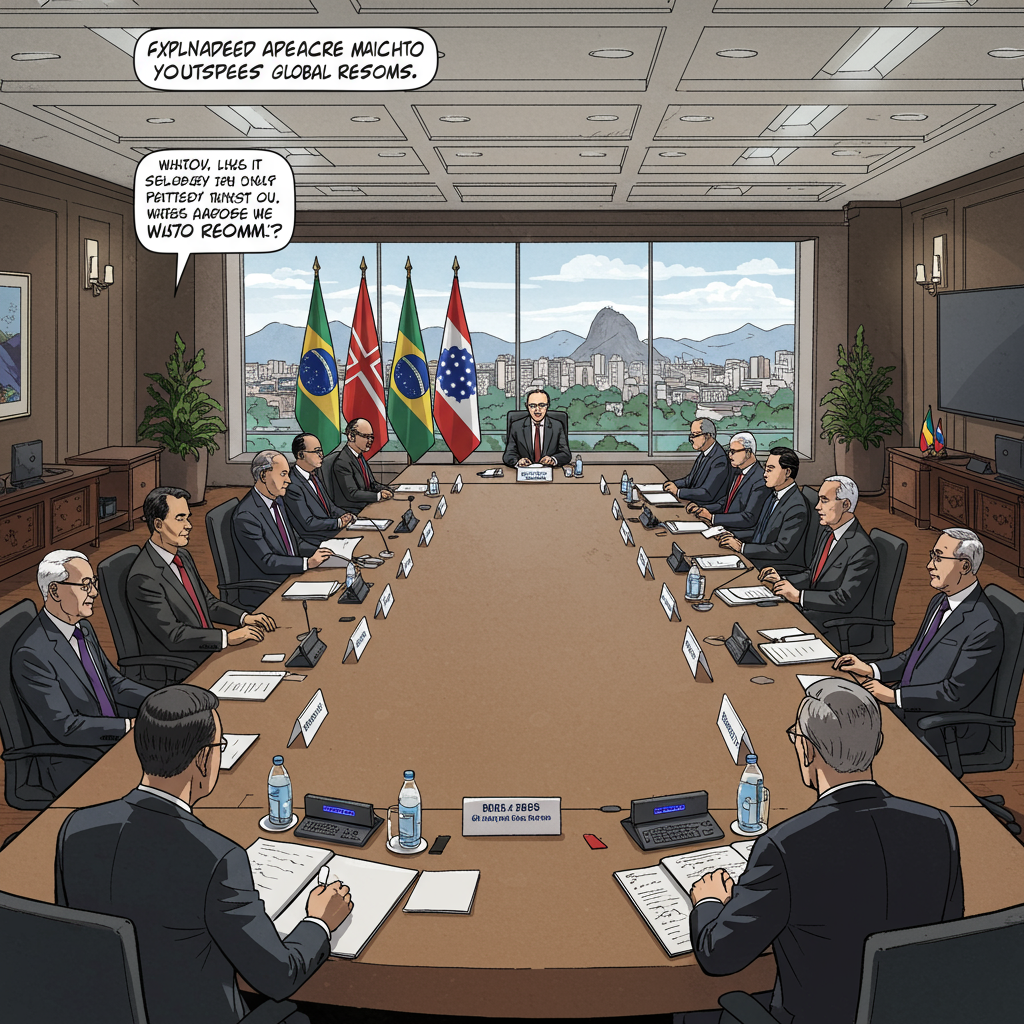Leaders of the increasingly influential brics bloc convened in Rio de Janeiro in July 2025. This significant gathering marked a pivotal moment for the expanded group of developing nations. Set against a global backdrop of shifting alliances and economic uncertainties, the summit underscored the bloc’s ambition to reshape the international order. Discussions focused sharply on advocating for reforms within traditional Western-dominated institutions like the IMF and the UN Security Council. The BRICS nations are positioning themselves as powerful defenders of multilateralism in an era marked by rising protectionism and geopolitical fragmentation.
A Gathering of Growing Influence
The Rio summit represented the latest chapter in the BRICS story. The group initially came together in 2009, bringing together Brazil, Russia, India, and China. South Africa joined later, solidifying its presence on the global stage. However, the most dramatic shift occurred just last year. Egypt, Ethiopia, Iran, Saudi Arabia, and the United Arab Emirates became full members, significantly broadening the bloc’s geographical reach and economic weight. This meeting in Rio was particularly notable as the first leaders’ summit to officially welcome Indonesia as a full member, further enhancing the group’s representation in Southeast Asia.
Brazilian President Luiz Inácio Lula da Silva, hosting the event, highlighted the bloc’s formidable scale. He pointed out that the expanded BRICS now represents over half of the world’s population. Furthermore, these nations collectively account for roughly 40% of the planet’s economic output. This sheer size grants the group substantial leverage on the global stage.
Challenging the Status Quo
A core theme echoing throughout the summit was the BRICS nations’ collective call for reforming the existing international financial architecture and defending global trade principles. President Lula specifically addressed a BRICS business forum, stressing the responsibility of emerging economies to uphold multilateral trade. This stance comes as a direct response to what the bloc perceives as a resurgence of protectionist measures globally.
Diplomats involved with the group suggest that BRICS is effectively stepping into a void left by traditional powers. One Brazilian diplomat noted that while the G7 still possesses considerable power, its historical dominance has diminished. The BRICS group, by contrast, is seen as rapidly filling this space, offering a platform for diplomatic coordination among developing nations.
Navigating a Fractured World
The summit occurred amidst a complex global landscape. Forums like the G7 and G20 have faced increasing internal divisions. The disruptive “America First” policies pursued by the US government under President Donald Trump have particularly highlighted divergences in global trade and foreign policy approaches. The BRICS bloc aims to provide a united front for the Global South. They aspire to give a meaningful voice to developing nations in global governance, especially within the trading system.
The expansion grants the BRICS group significant diplomatic weight. This newfound influence strengthens its advocacy for changes in major global institutions. Reforms to the UN Security Council and the International Monetary Fund are high on their agenda. They seek fairer representation and greater decision-making power for developing countries.
Key Discussion Points and Initiatives
Beyond the broad calls for systemic reform, the Rio summit agenda covered a range of critical issues. Given Brazil’s upcoming role as host of the UN climate summit, environmental concerns featured prominently. Brazil is leveraging its hosting of both major events to demonstrate the Global South’s commitment to tackling climate change challenges. This contrasts with policy shifts in some Western nations perceived as scaling back climate initiatives.
Concrete discussions included potential investments in conservation efforts. Both China and the UAE reportedly signaled interest in contributing to Brazil’s proposed Tropical Forests Forever Facility. This initiative aims to secure funding for the preservation of endangered forests worldwide, including the Amazon rainforest.
Addressing Trade and Geopolitics
Trade tensions remained a significant undercurrent. BRICS leaders were expected to reiterate their strong opposition to unilateral protectionist steps. Their prior statement in April had specifically criticized “unjustified unilateral protectionist measures,” citing the “indiscriminate increase of reciprocal tariffs.” This stance reflects widespread concern within the bloc regarding trade barriers and their impact on global economic growth.
Geopolitical matters also dominated discussions, though consensus proved challenging. Finding shared language for a joint statement on sensitive issues posed difficulties. Negotiations reportedly struggled to align positions regarding the conflict in Gaza and recent tensions between Israel and Iran. While the group reportedly adopted a firmer stance on Middle East conflicts compared to past statements, reaching full agreement required extensive deliberation.
Reform of the UN Security Council also presented hurdles. While diplomats reportedly agreed to endorse permanent seats for both Brazil and India, deciding on a single representative for Africa proved contentious among African nations within the bloc. This decision was ultimately deferred, highlighting the complexities of aligning diverse regional interests.
Challenges Amidst Growth
Despite its expanding footprint and ambitions, the BRICS bloc faces internal complexities. The inclusion of both major emerging economies and regional rivals introduces inherent challenges to maintaining shared objectives. The group’s growing heterogeneity means navigating diverse political systems and national priorities.
Attendance at the Rio summit reflected some of these complexities. Chinese President Xi Jinping did not attend in person, marking his first absence from a BRICS leaders’ summit since 2012. He sent Premier Li Qiang in his place. Russian President Vladimir Putin participated remotely via video link. This decision was necessary because Brazil is a signatory to the Rome Statute establishing the International Criminal Court, which had issued an arrest warrant for Putin. Brazil would have been obligated to enforce the warrant if he had traveled to Rio.
While these absences were notable, the summit still saw the physical presence of prominent leaders. Indian Prime Minister Narendra Modi and South African President Cyril Ramaphosa were among those gathering for face-to-face discussions. The high level of interest from other nations underscores the bloc’s growing appeal. Over 30 countries have reportedly expressed a desire to participate with BRICS, either as full members or strategic partners. This interest signals the potential for further expansion and influence, even as the group grapples with the challenges of its current diversity and the skepticism from some observers about its overall effectiveness in achieving radical global impact.
Frequently Asked Questions
What is unique about the BRICS summit held in Rio de Janeiro?
The 2025 BRICS summit in Rio de Janeiro was the first leaders’ summit to officially include Indonesia as a full member. This expansion followed the significant addition of Egypt, Ethiopia, Iran, Saudi Arabia, and the UAE the previous year. The meeting underscored the bloc’s growing size, now representing over half the world’s population and 40% of global GDP, and its collective push to reform international institutions and counter protectionism.
What specific initiatives were discussed at the Rio BRICS summit?
Beyond broad themes of reforming global finance and trade, the summit agenda included specific areas. Leaders discussed global health policies and artificial intelligence. Environmental cooperation was highlighted, with Brazil promoting its Tropical Forests Forever Facility aimed at conserving endangered forests. Both China and the UAE reportedly showed interest in investing in this climate initiative. Trade discussions reiterated the bloc’s opposition to “unjustified unilateral protectionist measures.”
Despite its growth, what are the main challenges facing the BRICS bloc?
The expanded BRICS group faces significant challenges due to its increased size and diversity. Including regional rivals makes achieving consensus on sensitive geopolitical issues difficult, as seen in negotiations regarding conflicts in Gaza and Israel-Iran, and the reform of the UN Security Council. Not all leaders attended in person (Xi Jinping sent his PM, Putin attended online due to an ICC warrant). Managing different political systems and national priorities within such a large group poses ongoing complexities for unified action and strategy.



